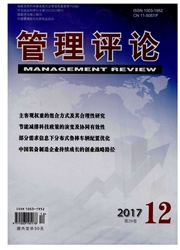

 中文摘要:
中文摘要:
社交媒体的特点是用户创造内容及用户互动,是社会化商务的关键。最新调查报告显示社交媒体面临着用户粘性下降的问题,不利于社会化商务的开展。针对社会化商务背景下的用户粘性,本文基于内容分析法梳理了用户粘性的前因,刻画了社交媒体的特点,并构建了相应的假设模型。实证结果显示用户互动通过自我效能、信任及虚拟社区感等认知因素的中介作用,间接影响到用户粘性;同时对虚拟社区感、自我效能与用户粘性之间的关系还有着调节作用。本文引入用户互动并分析了它对用户粘性的影响机制,将用户粘性的研究扩展到社会化商务情境下;引入了三维度的信任,发现基于品格的信任对用户粘性的影响不显著,解决了以往用户粘性研究中关于信任作用的矛盾之处。
 英文摘要:
英文摘要:
Social media has two significant characteristics, i.e., user-generated-content and interactivity, which are the sources of online traffic for social commerce. According to a latest report, social media is facing a problem of user stickiness decline. This paper focuses on user stickiness in social commerce era, and uses the term member interaction to describe the characteristic of social media. Our empirical results show that member interaction could affect user stickiness through the mediating roles of self-efficacy, trust, and sense of virtual community ; furthermore, member interaction could moderate the relationship between sense of virtual community, self-efficacy, and user stickiness. We integrate a new construct member interaction and analyze its impact on user stickiness, which could extend the conclusion of prior researches ; we use the three dimension of trust in our model and find the effect of integrity-based trust on user stickiness is not significant, which settles the trust-related contradiction in prior researches.
 同期刊论文项目
同期刊论文项目
 同项目期刊论文
同项目期刊论文
 期刊信息
期刊信息
